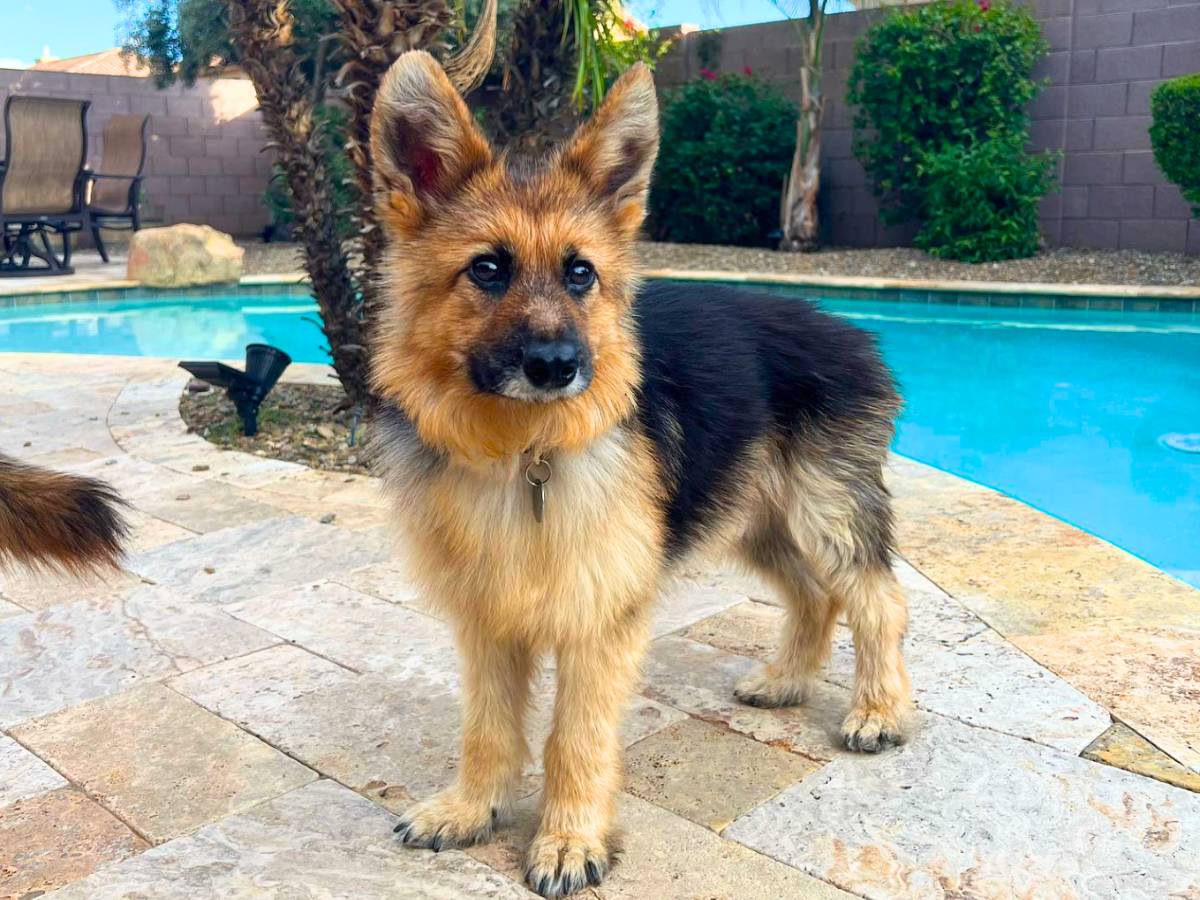German Shepherds are one of the most beloved dog breeds globally, but when they are born with dwarfism, their journey becomes unique and requires special care. Dwarfism in German Shepherds is a condition that affects their growth and development, leading to distinct physical characteristics. This article aims to explore the intricacies of dwarfism in German Shepherds, helping you understand the condition and how to manage it effectively.
Living with a German Shepherd with dwarfism can be both rewarding and challenging. Owners need to be aware of the specific needs and health issues that may arise due to this condition. By educating yourself, you can provide the best possible care for your furry companion.
In this guide, we will delve into the causes, symptoms, treatment options, and management strategies for German Shepherds with dwarfism. Whether you're a current owner or considering adopting one, this article will equip you with all the necessary information to ensure your dog lives a healthy, happy life.
Read also:Wanda Nara Instagram
Table of Contents
- What is Dwarfism in German Shepherds?
- Causes of Dwarfism
- Symptoms of Dwarfism
- Diagnosing Dwarfism
- Health Issues Associated with Dwarfism
- Managing Dwarfism
- Nutritional Needs for German Shepherds with Dwarfism
- Exercise and Mobility Considerations
- Adopting a German Shepherd with Dwarfism
- Community Support and Resources
What is Dwarfism in German Shepherds?
Dwarfism in German Shepherds refers to a condition where the dog experiences abnormal growth and development due to genetic or hormonal disorders. This condition results in disproportionate body structures, such as shorter limbs and a smaller overall size compared to standard German Shepherds. While dwarfism can occur in any breed, it is particularly noticeable in German Shepherds due to their large, athletic build.
Types of Dwarfism
There are several types of dwarfism in dogs, including:
- Chondrodysplasia: A genetic condition affecting cartilage and bone development.
- Hypothyroidism: A hormonal disorder that leads to stunted growth.
- Endochondral Ossification Disorders: Issues with bone formation during development.
Understanding the specific type of dwarfism your German Shepherd has is crucial for providing appropriate care.
Causes of Dwarfism
The causes of dwarfism in German Shepherds can be genetic, hormonal, or environmental. Genetic factors are the most common cause, with certain inherited traits leading to abnormal growth patterns. Hormonal imbalances, such as hypothyroidism or growth hormone deficiency, can also contribute to the condition. Additionally, poor nutrition during puppyhood may exacerbate the effects of dwarfism.
Read also:Morgan Lane
Genetic Factors
Genetic mutations play a significant role in dwarfism. These mutations can be inherited from one or both parents, leading to the development of the condition. Responsible breeding practices are essential to minimize the occurrence of dwarfism in German Shepherds.
Symptoms of Dwarfism
Recognizing the symptoms of dwarfism is vital for early diagnosis and intervention. Common signs include:
- Shortened limbs
- Disproportionate body size
- Delayed growth
- Abnormal joint development
- Difficulty walking
While these symptoms may vary in severity, they are indicative of potential dwarfism in German Shepherds.
Diagnosing Dwarfism
Diagnosing dwarfism in German Shepherds involves a combination of physical examinations, imaging tests, and laboratory analyses. Veterinarians may use X-rays to assess bone development and identify any abnormalities. Blood tests can help detect hormonal imbalances, such as hypothyroidism or growth hormone deficiencies.
Consulting a Veterinarian
It is crucial to consult a veterinarian if you suspect your German Shepherd has dwarfism. Early diagnosis allows for timely intervention and management, improving the quality of life for your dog.
Health Issues Associated with Dwarfism
Dwarfism in German Shepherds can lead to various health issues, including:
- Orthopedic problems: Joint pain, arthritis, and mobility issues.
- Respiratory difficulties: Narrow airways due to abnormal bone growth.
- Dental problems: Misaligned teeth due to a smaller jaw.
- Metabolic disorders: Hormonal imbalances affecting overall health.
Regular veterinary check-ups are essential to monitor and manage these health concerns effectively.
Managing Dwarfism
Managing dwarfism in German Shepherds requires a comprehensive approach that addresses both physical and emotional needs. Providing a supportive environment, proper nutrition, and regular exercise can significantly improve your dog's quality of life.
Creating a Comfortable Environment
Ensure your home is accessible and safe for a German Shepherd with dwarfism. This may include ramps for stairs, non-slip flooring, and comfortable bedding to alleviate joint pain.
Nutritional Needs for German Shepherds with Dwarfism
Nutrition plays a critical role in managing dwarfism. A balanced diet rich in essential nutrients can support healthy bone and joint development. Consult your veterinarian to determine the best diet for your dog's specific needs.
Key Nutrients
- Calcium: Supports bone health.
- Vitamin D: Enhances calcium absorption.
- Omega-3 Fatty Acids: Reduces inflammation and promotes joint health.
Exercise and Mobility Considerations
Exercise is important for maintaining muscle strength and joint flexibility in German Shepherds with dwarfism. However, it is essential to tailor exercise routines to your dog's abilities and limitations. Low-impact activities, such as swimming or short walks, are ideal for maintaining mobility without exacerbating joint issues.
Tips for Safe Exercise
- Avoid high-impact activities that strain joints.
- Monitor your dog's energy levels and rest periods.
- Use supportive equipment, such as harnesses, to assist with mobility.
Adopting a German Shepherd with Dwarfism
Adopting a German Shepherd with dwarfism can be a rewarding experience. These dogs often have unique personalities and bring immense joy to their families. However, it is important to consider the additional care and resources required to support their needs.
Things to Consider
- Financial commitment for veterinary care and specialized diets.
- Time investment for training and socialization.
- Emotional preparedness to handle potential health challenges.
Community Support and Resources
Connecting with other German Shepherd owners and dwarfism support groups can provide valuable insights and encouragement. These communities offer a platform to share experiences, advice, and resources, helping you navigate the journey of caring for a German Shepherd with dwarfism.
Recommended Resources
- Online forums and social media groups dedicated to German Shepherds with dwarfism.
- Veterinary specialists specializing in orthopedic and hormonal conditions.
- Local dog clubs and breed organizations offering support and education.
Kesimpulan
In conclusion, German Shepherds with dwarfism require special attention and care to ensure they lead fulfilling lives. By understanding the causes, symptoms, and management strategies for dwarfism, you can provide the best possible environment for your dog. Remember to consult with veterinarians and utilize available resources to address any health concerns effectively.
We encourage you to share this article with fellow dog lovers and leave your thoughts in the comments below. For more informative content about German Shepherds and other dog breeds, explore our website further. Together, let's create a supportive community for all dogs, regardless of their unique challenges.
Data and references used in this article are sourced from reputable veterinary organizations and scientific studies, ensuring the information provided is accurate and reliable.

:max_bytes(150000):strip_icc():focal(675x0:677x2)/puppy-dwarfism-4-1-2000-8121e2acf8324f9eb584d4982cda06c5.jpg)
